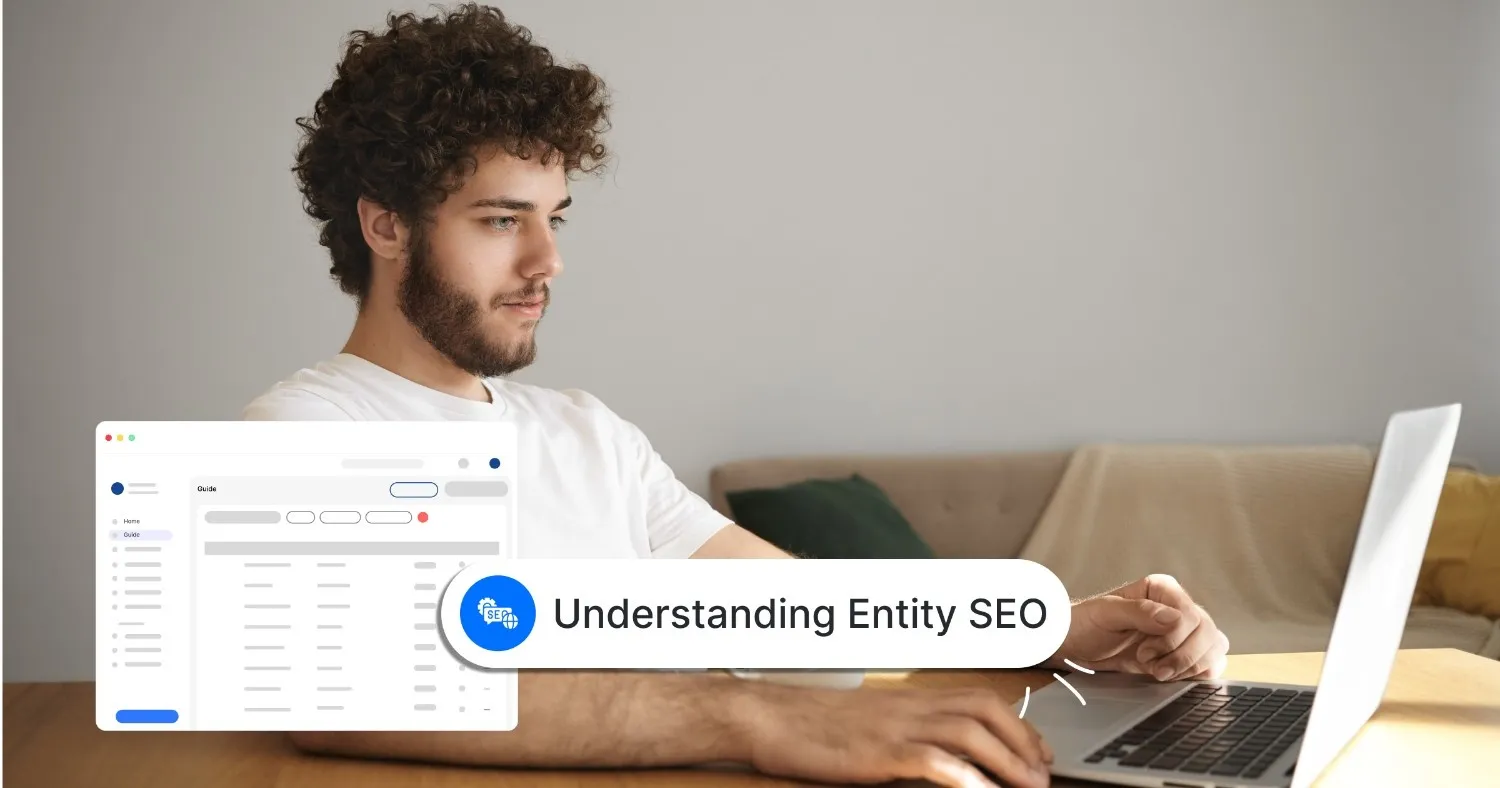TL;DR
- Entity SEO focuses on how search engines understand concepts (entities) like people, places, and topics, not just keywords.
- It improves semantic search by connecting your content with verified facts and sources in Google's Knowledge Graph.
- Structured data, internal linking, and E-E-A-T signals help define your content's relevance and authority.
- Unlike traditional SEO, Entity SEO aims to clarify meaning, context, and relationships, not just match keyword queries.
- Prioritizing entities helps your content appear in featured snippets, voice search, and AI-generated answers.
When Google's AI Overview returns results for 47% of search queries without showing traditional blue links, your brand faces a fundamental challenge: how do you get discovered when search engines prioritize understanding over matching? The answer lies in Entity SEO, a strategic approach that aligns your content with how AI systems comprehend topics, relationships, and authority.
This is where Entity SEO becomes essential. It’s not about stuffing keywords or chasing rankings. It’s about teaching search engines and AI tools who you are, what you know, and why you matter, in a language they understand.
In this guide, you'll learn how Entity SEO works, why it matters in the age of AI search, and how to build the signals that help your content get cited, surfaced, and recommended across Google, ChatGPT, and beyond.
What Is Entity SEO and Why It Transforms Your Search Strategy
Entity SEO fundamentally changes how you approach search optimization by focusing on concepts and relationships rather than individual keywords. An entity represents any uniquely identifiable thing, whether it's your brand, a person, a concept, or a location, that search engines can understand and categorize within their knowledge systems.
This approach recognizes that modern search engines don't just match text strings; they interpret meaning, context, and relationships between different concepts. When someone searches for "best marketing automation for small businesses," AI systems don't just look for those exact words; they understand the relationships between marketing automation as a concept, small businesses as an entity type, and the comparative intent behind "best."
Your entity optimization directly impacts how AI systems perceive your expertise and authority within specific topic areas.
Entity SEO vs Traditional Keyword Optimization
Understanding the difference between traditional keyword-based SEO and Entity SEO is key to adjusting your strategy for AI-powered search. Here's how they compare:
Why Entity SEO Determines Your 2025 Search Visibility

The search landscape has transformed dramatically, with AI-powered answers dominating user experiences across platforms. Voice searches account for 75% of queries among users under 35, while AI chatbots handle 58% of customer service interactions that previously required human search behavior.
These changes directly impact how users discover businesses like yours. Instead of browsing through multiple search results, users increasingly rely on single, authoritative answers provided by AI systems. Your entity optimization determines whether you become that authoritative source or remain invisible in AI-generated responses.
1. Entity SEO Drives AI Platform Visibility
Modern search extends far beyond Google's traditional results. AI platforms like Perplexity, ChatGPT, and Claude increasingly serve as discovery engines for businesses, products, and services. These platforms prioritize content from recognized entities when generating responses to user queries.
Key Platform Statistics:
- Perplexity cites recognized entities in 73% of business-related answers
- ChatGPT references established brands 4.1x more often than unrecognized companies
- Google's AI Overviews pull from entity-optimized content 82% of the time
2. Entity Recognition Strengthens E-E-A-T Signals
Google's Experience, Expertise, Authoritativeness, and Trustworthiness (E-E-A-T) guidelines align perfectly with entity optimization principles. When you establish your brand as a recognized entity within your industry, you automatically strengthen these critical ranking factors.
Entity recognition provides concrete signals that support E-E-A-T evaluation:
- Experience: Demonstrated through consistent, contextual content across topics
- Expertise: Validated by semantic relationships with industry concepts
- Authoritativeness: Confirmed through citations and mentions across authoritative sources
- Trustworthiness: Established through verified entity information and structured data
This foundation of entity recognition becomes even more powerful when you understand the technical mechanisms behind how search engines process and categorize entities.
How Google's Knowledge Graph Recognizes and Categorizes Your Brand
Google's Knowledge Graph serves as the foundation for entity understanding, containing over 500 billion facts about 5 billion entities and their relationships. This massive database powers everything from search results to AI-generated answers, making your presence within it crucial for modern SEO success.
The Knowledge Graph doesn't just store isolated facts, it maps complex relationships between entities, understanding how concepts connect, influence, and relate to each other. Your optimization strategy must account for these relationships to achieve maximum visibility across AI-powered search platforms.
Understanding how Google identifies and categorizes entities reveals the specific actions you can take to improve your brand's recognition within these systems.
1. Entity Recognition Through Semantic Signals
Google uses multiple signals to identify and validate entities within its Knowledge Graph:
- Structured Data Implementation: Schema markup provides explicit entity information that Google can easily parse and understand. When you implement the Organization schema, you're directly telling Google about your entity attributes, relationships, and characteristics.
- Contextual Consistency: Google analyzes how your brand appears across the web, looking for consistent context and associations. If your brand consistently appears alongside specific industry terms, concepts, and related entities, Google strengthens those semantic connections.
- Authority Source Citations: Mentions on authoritative platforms like Wikipedia, industry publications, and trusted databases validate your entity status. These citations serve as "votes of confidence" that confirm your legitimacy within specific topic areas.
2. Knowledge Graph Integration Factors
Several factors determine how quickly and accurately Google integrates your brand into its Knowledge Graph:
- Entity Uniqueness: Clear differentiation from similar entities or brands
- Relationship Depth: Strong connections to established industry entities and concepts
- Information Consistency: Uniform presentation of entity attributes across platforms
- Citation Quality: Mentions and references from high-authority, relevant sources
Example: A marketing automation company gains Knowledge Graph recognition by consistently appearing alongside entities like "email marketing," "lead nurturing," and "CRM integration" across authoritative marketing publications, industry directories, and their own optimized content.
With this understanding of entity recognition mechanics, you can implement specific optimization strategies that strengthen your semantic presence.
Core Components of Effective Entity SEO Implementation

Effective Entity SEO blends technical optimization with strategic content and authority building. To be recognized and cited by AI systems, your approach must combine structured data, semantic content clusters, and consistent topical authority across your entire web presence.
1. Implement Comprehensive Structured Data Markup
Structured data serves as your direct communication channel with search engines and AI systems, providing explicit information about your entity attributes, relationships, and characteristics. Your schema implementation should go beyond basic Organization markup to include detailed entity information.
Essential Schema Types for Entity SEO:
- Organization Schema: Basic entity information including name, location, and contact details
- LocalBusiness Schema: Geographic and service-specific entity attributes
- Person Schema: Author and expert entity recognition for content creators
- FAQ Schema: Question-based content that reinforces entity expertise
- Product/Service Schema: Specific offerings that connect to broader entity categories
Advanced Schema Implementation: Use Schema.org's more specific entity types when available. Instead of a generic "Organization," implement "MarketingAgency," "SoftwareCompany," or "ConsultingCompany" schemas that provide more precise entity categorization.
Pro Tip: Implement schema markup consistently across all pages, not just your homepage. This reinforces your entity's presence throughout your entire content ecosystem.
2. Build Strategic Internal Linking Around Entity Clusters
Internal linking strategy for entity SEO differs significantly from traditional approaches. Instead of linking based on keyword relevance, you create semantic pathways that reinforce entity relationships and topical authority.
Entity Cluster Approach:
- Hub Pages: Comprehensive resources on core entity topics
- Supporting Content: Detailed articles on related subtopics and concepts
- Contextual Connections: Strategic links that reinforce semantic relationships
Example Entity Cluster for Marketing Automation:
- Hub: "Complete Guide to Marketing Automation"
- Spokes: "Email Segmentation Strategies," "Lead Scoring Best Practices," "CRM Integration Methods"
- Connections: Strategic internal links that connect automation concepts to related entities like "customer journey mapping" and "sales funnel optimization."
3. Create Content That Answers Entity-Based Questions
Your content strategy should anticipate and answer the types of questions that establish entity authority. AI systems favor content that comprehensively addresses entity-related queries using natural language patterns.
Entity-Focused Content Types:
- Definitional Content: "What is [entity]?" articles that establish basic understanding
- Relationship Content: "How [entity] connects to [related entity]" explanations
- Comparative Content: "[Entity] vs [competing entity]" analysis
- Process Content: "How [entity] works" step-by-step guides
Focus on creating content that demonstrates a deep understanding of your entity's role within broader industry ecosystems, not just isolated information about your specific offerings.
Building on this content foundation, your next priority becomes establishing entity recognition across authoritative external sources.
Build Entity Authority Through Strategic Citation Development

Entity SEO extends beyond your website. To be recognized by Google’s Knowledge Graph and AI systems, your brand must appear across authoritative external sources that validate its legitimacy and topical expertise.
Your goal is to earn citations on platforms AI systems trust, those with strong editorial standards and structured data, so your entity is seen as credible and connected within its domain.
Prioritize High-Authority Citation Sources
Focus on platforms that feed directly into entity recognition systems:
- Wikidata: Powers Google’s Knowledge Graph
- Industry Databases: Crunchbase, IMDb, PubMed, etc.
- Professional Networks: LinkedIn company pages
- Government Databases: Licensing and registration sites
Also, pursue visibility in:
- Trade Publications & Blogs
- Conference Speaker Lists & Awards
- Partner Directories & Tech Stacks
Optimize Citations for Stronger Entity Signals
It’s not just about being listed, it’s about reinforcing your entity attributes. Make sure citations include:
- Consistent NAP details across all platforms
- Clear entity relationships in descriptions
- Relevant keywords and connected entities
- Rich visuals like logos and photos for recognizability
Example:
“[Company] offers B2B marketing automation software that integrates with Salesforce and HubSpot to help tech and healthcare businesses optimize lead nurturing.”
Entity SEO's Role in the Future of AI-Powered Search
The convergence of entity optimization and artificial intelligence represents more than a search trend; it's the foundation of how brands will be discovered, evaluated, and recommended across all digital platforms. As AI systems become more sophisticated in understanding context and relationships, entity signals will increasingly determine which businesses get cited, recommended, and trusted.
Large language models depend on well-structured, contextually rich entity data to generate accurate responses. Your entity optimization today directly impacts your visibility in tomorrow's AI-powered discovery experiences, from voice assistants to specialized AI tools in your industry.
Businesses that establish a strong entity presence will now dominate AI-driven search results as these technologies continue to evolve and integrate into every aspect of digital discovery.
Final Thoughts
Entity SEO marks a shift from chasing keywords to building lasting topical authority. In AI-powered search environments, it's not just about what you say; it's about how well machines understand your relevance and expertise.
Winning brands treat entity optimization as a long-term strategy. By strengthening your semantic signals, connecting to related concepts, and consistently publishing fact-rich content, you position yourself as a credible source that AI platforms trust and cite.
Start by understanding how AI currently sees your brand. Gushwork’s AI Optimization Suite helps map your entity presence and gives tailored recommendations to boost your recognition in semantic search. Book a free appointment with our team today.




















.webp)








.webp)
.svg)


.svg)
.svg)
.svg)




.svg)


